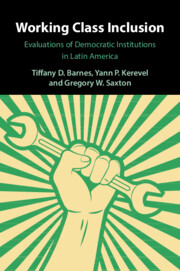Refine search
Actions for selected content:
3 results
2 - A Theory of Working-Class Inclusion
-
- Book:
- Working Class Inclusion
- Published online:
- 26 October 2023
- Print publication:
- 09 November 2023, pp 27-52
-
- Chapter
- Export citation
1 - Introduction
-
- Book:
- Working Class Inclusion
- Published online:
- 26 October 2023
- Print publication:
- 09 November 2023, pp 1-26
-
- Chapter
- Export citation

Working Class Inclusion
- Evaluations of Democratic Institutions in Latin America
-
- Published online:
- 26 October 2023
- Print publication:
- 09 November 2023
